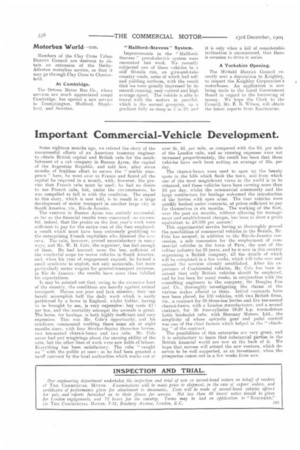Important Commercial-Vehicle Development,
Page 6

If you've noticed an error in this article please click here to report it so we can fix it.
Same eighteen months ago, we related the story of the unsuccessful efforts of an American tramway engineer to obtain British capital and British cabs for the establishment of a cab company in Buenos Ayres, the capital of the Argentine Republic, and told how, after seven months of fruitless effort to secure the " nimble ninepence " here, he went over to France and found all the capital he required in a month, with, however. the proviso that French cabs must lie used he had no desire to use French cabs, but, under the circumstances, he was compelled to fall in with the condition. The sequel to this story, which is now told, is to result in a large development of motor transport in another large city in South America., "Viz., Rio de Janeiro.
The venture in Buenos Ayres was entirely eueressful, so tar as the financial result; were coneerned—so successful. indeed, that the profits on the first year's work were sufficient to pay for the entire cost of the fleet employed, a result which must have been extremely gratifying to the enterprising French capitalists who financed the elmeern. The cabs, however, 3roved unsatisfactory in mary ways, and Mr. -W. H. Cole, the organizer, has had enough of them. He had learned, none the lees, sufficient of the wonderful scope for motor vehieles in South Ameriea, and. when his year of engagement expired, he formed a small syndicate to exploit, not only motorcabs. but more particularly motor wagons for general-transport purposes, in Rio de Janeiro: the results have more than fulfilled his expectations.
It may he pointed out that, owing to the excessive heat of the country, the conditions are heavily against animal transport. Horses are poor and lack stamina ; they ran barely accomplish half the daily work which is easily performed by a. horse in England, whilst fodder, having to be brought by sea, is very expensive: hay costs per ton, and the mortality amongst the animals is great. The horse. for haulage, is both highly inefficient and very expensive. This was Mr. Cole's opportunity, and his syndicate commenced working there some six or eight months since. with four Straker-Squire three-ton lorries, two ten-seated chars-'a-banes and two cabs. Mr. Cole never had any misgiving.s about the earning ability of the cribs, but the other lines of work were new fields of labour. Everything has been eatiefaetory. The cabs " caught on " with the public at once; as he had been granted a tariff contract by the local authorities, which works out at
over 2s. 2d. per mile, as compared with the Sd. per mile of the London cabs, and as running expenses were not increased proportionately, the result has been that these vehicles have each been nettinty an average of 35s. per day.
The chars-h-hancs were used to open up the beauty spots in the hills which flank the town, and from which one of the most magnificent views in the world is to be obtained, and these vehicles have been earning more than 1'..6 per day, whilst the commercial community and the lerge contractors for haulage welcomed the introduction of the lorries with open arms. The four vehicles were quickly booked under contracts, at prices sufficient to pay for themselves in six months. The working of the fleet, over the past six months, without allowing for management and establishment charges, has been to show a profit equivalent to 5.:8,000 per annum!
This experimental service having so thoroughly proved the possibilities of commercial vehicles in the Brazils, Mr. Cole has secured, in addition to the Rio-de-Janeiro eoncession, a sole concession for the employment of eommercial vehicles in the town of Para, the seat of the robber industry for 25 years, and he is now in this ccm eery organizieg a British company, all the details of which will he completed in a few weeks, which will take over and extend the services already established. After his experience of Continental vehicles, Mr. Cole Kee been insistent that only British vehicles should be employed, arid be has been for many weeks, in conjunction with the consulting engineers to the company, Sir Douglas Fox and Co., thoroughly investigating the claims of the various makes offered to them. Initial contracts have now been placed, for 105 vehicles, with two British firms, viz., a contract for 50 three-ton. lorries and five ten-seated chars-h-bancs, with a London manufacturer, and a second contract, for 50 four-cylinder 18-20 h.p. worm-driven. Lotis landaulet cab, with Sturmey Motors, Ltd., the simplicity of whose epicyclic gear and pedal control was one of the chief factors which helped in the "
ing " of the contract. The possibilities of this enterprise are very great, and it is satisfactory to learn that substantial parties in the British financial world are now at the back of it. We hope that success will attend tile new venture, which deserves to he well supported, as an investment, when the prospectus comes out in a few weeks from now.




















